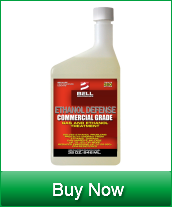Using a Fuel Additive to revive Old Gas
All petroleum fuels have a limited storage life. Over time, their quality will degrade and change ("break down") primarily because of chemical...

This is a question that under-girds a lot of the discussions about fuel additives. Do they really work? It's a fair question that's important to have a good answer to if you're going to have confidence in making a decision on whether to spend your hard-earned money on something that may claim to help you.
I'm semi-famous around Bell Performance for the 'it depends' answer, because it's so appropriate to use in so many situations. In this, the 'it depends' answer stems from a couple of followup questions:
![]() In reality, "fuel additives" are a really broad class of things. A fuel additive is anything added to a base refined fuel to impart a desired benefit. What kind of benefit? Raise its cetane value. Improve its resistance of oxidation and degradation. Kill microbial growth in the fuel and associated water.
In reality, "fuel additives" are a really broad class of things. A fuel additive is anything added to a base refined fuel to impart a desired benefit. What kind of benefit? Raise its cetane value. Improve its resistance of oxidation and degradation. Kill microbial growth in the fuel and associated water.
One thing you'll notice is that those things aren't usually what consumers go out looking for fuel additives to do. Those are industrial problems associated with the large volumes of fuel used by businesses and government.
And yet......that's exactly why we know fuel additives do work. The people who have large amounts of money riding on the performance of their fuels know fuel additives are essential pieces of fuel care.
But what about all those additives that claim to do everything plus clean the kitchen sink for your momma? They're just snake oil.
You know what? You're probably right. There's a lot of worthless snake oil out there. But that's why we circle back to the two previous questions. What do you need a fuel additive to do? Would you know what to look for in order to judge if it worked?
The problem with a lot of consumer aftermarket fuel additives is that there's so much competition, many in the market have decided to try and set themselves apart by over-promising and under-delivering. Except by the time the customer realizes the under-delivering part, their money is long gone and never to return. The over-promising is easy. Anyone can claim whatever they want and who's to know if it's a bunch of hot air or not? Their customers have no idea about fuel chemistry and what's supposed to do what by when. They rely on customer ignorance combined with hope. This invariably leads to disappointment.
If you're going to ask if fuel additives work, the most important question you should ask (yourself) is what do you need it to do? There are plenty of chemistries that will, indeed, work when put into fuel. But that doesn't mean they will meet all of the expectations of everyone who buys them. It's not reasonable to expect that, and if you think about it, we think you'd agree.
I want 25% better gas mileage - well, that's probably not going to happen. Why not? That's what they said. Well, they over-promised on that. BUT, you CAN get better gas mileage under certain circumstances. And it doesn't happen by magic. There's no magic "additive potion" that won the Nobel Prize for Physics in 1973 and won some NASA award that's now available to the general public. THERE ARE legitimate things that will improve fuel economy, but those are centered on cleaning the engine, fuel injectors, and fuel system in order to return the car to the state of performance it had when it was new. Those are a legitimate effect of fuel additives (provided they actually contain detergency to do that).
So whether a fuel additive works depends on your expectations. There are plenty of genuine chemistries out there that have been proven to work.
....if he really loves me. No, not Whitney Houston. How do you know if the claims of what you're buying are true vs. exaggerated? We can't account for every kind of possible claim, but here are some general rules of thumb.
Ok, maybe not that. But does it claim to do 17 different things and then some? And claim to regrow hair (which is the Ron Popeil-equivalent of claim to raise gas mileage by "up to 25% or more")? The more things something claims to do, the less chance it can actually do any of those things effectively.
A big reason for this is that the more things an additive has to do, the more active ingredients the formula has to contain to do those things. You start running into problems with "formula space" - especially when you throw in the fact that some things require higher treat rates in order to do just that thing. For example, raising diesel fuel cetane rating by a noticeable amount can't be done with just a "drop" of additive. Lowering diesel gelling temperature by "up to 40 degrees" is another popular exaggeration that doesn't stand up to this kind of logical test. You need 1:1000 or more of a cold flow treatment to have that kind of positive impact. You're not going to get that with a multi-function that claims 17 different things at a tiny treat rate.
What's more, the fuel additives that claim to do everything under the sun are even less likely to be legitimate because their manufacturers rely on marketing impact to get the sales. So they HAVE TO make exaggerated claims to get that first sale. Once people use it, and once it does nothing, they don't return. That's par for the course in the fuel additive industry.
The fewer the product claims, the greater chance it's going to be able to do those things, and do them well. We can't tell you a set limit on product claims; it's a fluid concept. But you'll probably be able to recognize it if you see it.
If you just want better gas mileage, that's an easier one to assess (though some people do mess that one up). That's not true of all kinds of fuel issues that require additization. Additives for stabilization or water control aren't so easy to know if they're working. There are tests you can do (like tests to measure stability rating or water content) but those aren't going to be done by the average consumer.
What should you do? Look for established chemistries that have been in the marketplace for an extended period of time. Look for fuel additive chemistries that are used in the business community. You can repurpose their experiences for yourself here. If a fuel additive really doesn't do what it's supposed to, you won't find many business or professional users for that kind of chemistry.
All petroleum fuels have a limited storage life. Over time, their quality will degrade and change ("break down") primarily because of chemical...

Gas prices may be going down but it's always a great idea to be thinking about saving money on the road by doing some little things to get better...

So why does gas go bad? It all has to do with gasoline's chemical composition.